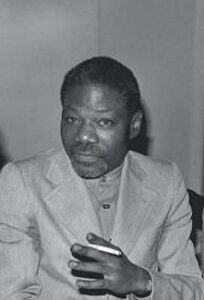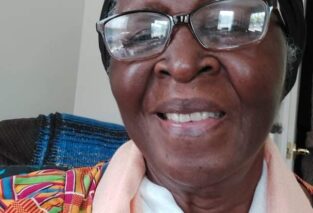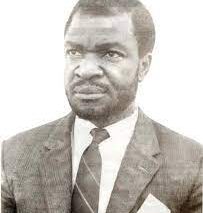
(Revised and reproduced from Cameroon Tribune, Friday, September 9, 1988)
As a student of Comparative Literature, I have always been eager to meet creative writers, especially African. Whenever I attend a literary conference, I always listen attentively to those story-tellers, picking up each word that drops form their lips, turning it back and forth in my hand, spreading it out eagle-like on paper, dissecting and analysing it with care, trying to fondle the very hidden folds of each writer’s creative genius
That is precisely what happened when several years ago, I met for the first time, one of Africa’s most prolific writers, the great Congolese poet/playwright/novelist, Tchicaya U’Tamsi, of blessed memory.
This is not a traditional tribute to a writer in which you would expect to read a brief analysis of his or her life and works, but this is rather a recollection of two encounters I had with Tchicaya.
The first one came at a period of particularly intense literary effervescence in Africa where proponents and opponents of such concepts as ‘’Négritude,’’ “African Personality,’’ ‘’Métissage Culturel,’’ etc, were clashing daily in literary arenas.
Wole Soyinka, then considered by many as the ‘’l’enfant terrible’’ of African literature and who, several decades later, was to bring so much honour to African letters as the first African and black man to receive the much coveted Nobel Prize in Literature, further muddied the already turbid waters of the African literary spring with another problematical coinage: ‘’Tigritude’’.
It was during that period of confusion on the African literary scene that I met Tchicaya U’Tamsi in person for the first time at the Sorbonne in Paris. On that particular day, he was being ruthlessly assailed by a group of very unsympathetic critics for writing what they said was ‘’hermetic’’ poetry.
I remember one of them in particular as an outspoken fellow from the West African nation of Benin, then one of the hotbeds of Marxism-Leninism in Africa where neighbours were said to greet each other with the promise to either crush the ‘’evil head of imperialism’’ or else perish in the attempt.
Our vocal Marxist-Leninist, punching the air with a clenched first, dismissed Tchicaya’s massive literary output as sheer ‘’bourgeois nonsense.’’ Scandalised by such rather insulting outbursts, some of us rallied around Tchicaya and our fiery revolutionary slammed the door in our faces and we could hear him in the corridor loudly denouncing all of us as the ‘’lèches cul de l’impérialisme yanqui’’ (‘’ass-lickers of Yankee imperialism’’).
What struck me as I watched that confrontation was Tchicaya’s admirable self-control. He appealed for tolerance of others’ views, strongly defended artistic freedom, denied that his work was hermetic and invited his critics to penetrate his literary creation through the doors of black history; an advice I was to find quite helpful later.
Our paths were to cross again some five or six years later, still at another literary conference in Paris. I remember walking into an amphitheatre packed full of students of African Literature like me, who had come to see and listen to some African writers of international renown confronting critics with sparkling credentials. Whenever those ones meet, there’s always lightening in the air.
At the high table, occupying his rightful place among those heavyweights of African Literature, was Tchicaya U’Tamsi. Our eyes happened to meet and, half way between standing and sitting, I bowed to that loyal son of Africa. I saw his eyes light up in surprise for a few seconds and then he too bowed his head slightly.
When his turn came to speak, and just as he had done several years before, he again strongly defended artistic freedom and rejected the rigidity of certain ideologies that were- and sadly still are – stifling artistic creativity in Africa . He then concluded with the hope that out of the turmoil and decay of the present, a new and better Africa would eventually emerge.
That was well over a decade ago already. But the other day when the news of his death dropped on my breakfast plate, I picked it up in surprise and utter consternation. Then I looked up and thought I could see his face looming at the corner over the table where my two children were having their usual noisy breakfast. I stood up and bowed to one of the most fertile minds the black race has produced so far. There was something like a smile on his face just as the angelic voices of his ancestral Muses were escorting him into the depths of eternity.
I salute his memory.


